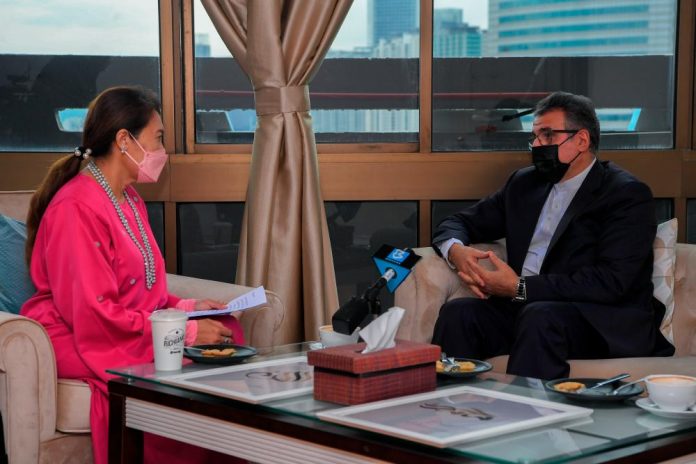Iranian Ambassador to Malaysia Ali Asghar Mohammadi emphasised the importance of cultural diplomacy to foster mutual understanding and elevate Iran-Malaysia bilateral relations.
Mohammadi said both countries have many things to offer, adding that Putrajaya and Isfahan (central Iran) are “twin cities” that should be promoted to the people of both countries.
The design of the Putra Bridge, one of the notable bridges in Putrajaya linking Dataran Putra with Persiaran Perdana, is inspired by the famous Khaju Bridge in Isfahan.
“Your tradition, your beautiful festivals,…I think this is something we need to learn from each other. We (Iran) also have good artists coming to Malaysia; they have very good paintings and calligraphies,” he said to Bernama during his courtesy visit to Chairman of Malaysian National News Agency (Bernama) Senator Datuk Ras Adiba Radzi at Wisma Bernama here, recently.
Politically, Mohammadi said Iran and Malaysia are moving in the right direction and he expected both countries to work more closely on international platforms such as the Non-Aligned Movement (NAM) and Organisation of Islamic Cooperation (OIC).
On economic ties, he said Iran is one of the largest importers of Malaysia’s palm oil among countries in the Middle East, and is poised to continue increasing palm oil imports from Malaysia.
Last year, Malaysia’s palm oil exports to Iran were estimated at 320,000 tonnes and as of May this year, a total of 238,683 tonnes of palm oil worth over RM970 million were exported to the country.
The ambassador said Iran also hoped to encourage collaboration between Bernama and Iranian media organisations to strengthen people-to-people relations.
“They (Iranian media organisations) are quite ready, in fact, to receive any good proposal or joint programme, even online,” he said.
Mohammadi added the media can play a role in changing the misperception about Muslim countries such as gender inequality in education, pointing out that female students make up 60 to 65 per cent of the total enrollment in Iran’s higher education institutions.
“I’m very grateful and happy that despite having some sort of misperception, we are moving in the right direction. Of course, we have learned from Malaysia, and also vice versa.
“This is one area that we need to work on — how the Islamic countries and the women affairs can work together, because we are victims of the sort of Western values; (and) that we are neglecting this,” he added.
Source: Bernama




